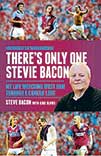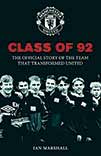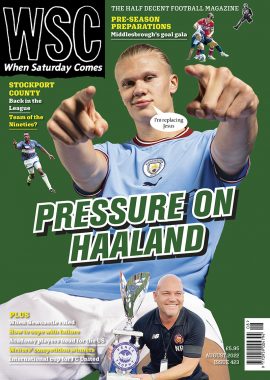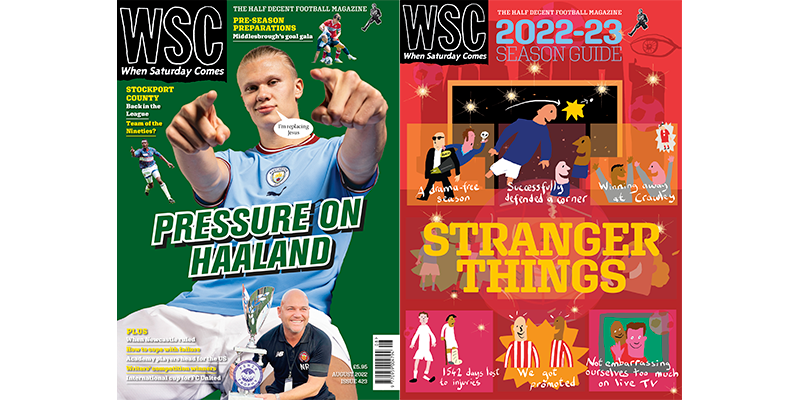Search: 'Brian Kidd'
Shop
Stories
In this exclusive WSC Supporters’ Club edition of the podcast with magazine editor Andy Lyons, writer Harry Pearson and host Daniel Gray, the Random Topic Generator throws up the topic of People Associated With One Club Working For Another, leading to mentions for Brian Kidd, John Rudge, Guy Roux and many more persons of interest. There is a run through of misremembered things including World Cups 66 and 90, and discussion of notable referees from Gordon Hill and his collar to Pat Partridge’s registration plate. Record Breakers takes us to Florence, Guadalupe and Waldenbuch.
 My life watching
West Ham through
a camera lens
My life watching
West Ham through
a camera lens
by Steve Bacon & Kirk Blows
Biteback, £15.99
Reviewed by Neil Fairchild
From WSC 310 December 2012
When Steve Bacon was appointed West Ham club photographer in 1980, John Lyall was only the fifth West Ham manager of the 20th century. In the 23 years since Lyall’s departure, there have been nine different permanent managers and almost as many promotions and relegations. For Hammers fans the familiar rotund figure of Bacon waddling across the pitch on matchdays has become a reassuring constant in an uncertain world.
Until Alan Pardew arrived in 2003 Bacon would travel to away matches on the team coach. He would even be present in the dressing room during team talks. There’s Only One Stevie Bacon is a behind-the-scenes glimpse at the dysfunctional world of West Ham over three decades, with a chapter dedicated to the tenure of each manager from Lyall to Gianfranco Zola.
Although Bacon’s subjectivity gives the book a partial and at times spiteful feel – Paul Kitson is a “weasel”, Brian Kidd a “horrible little shit” – his refusal to pander to fans’ preconceptions makes for a refreshing viewpoint. Ron Greenwood is an “awkward bugger” and Pardew, who was the last manager to have his name sung by West Ham fans, is repeatedly dismissed as arrogant and mocked for his use of psychology and motivational techniques. Lou Macari, loved by neither fans nor players, is portrayed in a surprisingly compassionate light. Others are depicted in exactly the way you would expect: old-fashioned Billy Bonds, for example, struggles with the modern world. Following rumours about the close relationship between Ian Bishop and Trevor Morley, Bonds calls both players into his office and asks: “Well, are you or ain’t you?” It turns out they ain’t.
Kirk Blows, author of various books on West Ham, has been enlisted to bring a sense of cohesion to these anecdotes. Blows appears to have viewed his role as that of articulating Bacon’s thoughts rather than challenging them. At times some editing would have been kind. Bacon’s bafflement at the poor quality of televisions in a department store in 1980s communist Romania (“the arsehole of the universe” as he charmingly calls it) would have been a useful omission.
Bacon is the first to admit that he is no football expert and this book sheds little light on why the FA Cup that was won just before his arrival was the club’s last piece of major silverware. Nevertheless there are plenty of interesting and funny tales: the team coach stopping on the way to a match at Stoke to allow the kit manager to put a bet on for Macari; a naked John Moncur jumping out of a locker during one of Harry Redknapp’s team talks; a frightened Paolo di Canio telling a stewardess “I don’t want to die” before getting off a plane that is about to take off.
Far too often the tone of the book is brought down by stories that would be better left in the pub. His fondness of Mark Ward’s wife’s “big boobs” and a players’ masturbation competition on the team coach (yes, really) are two examples. Then again, given the niche target market for this book, perhaps Bacon simply has a good understanding of his audience.
 The official story of the team that transformed United
The official story of the team that transformed United
by Ian Marshall
Simon & Schuster £18.99
Reviewed by Joyce Woolridge
From WSC 307 September 2012
“He’s only tiny; he’s got ginger hair – you’ll probably have a bit of a laugh. But he can’t half play.” Thus Brian Kidd prepared Eric Harrison, Manchester United’s celebrated youth team coach, for the less than auspicious arrival of the young Paul Scholes at the Cliff training ground. Scholes’s success and longevity is perhaps the most remarkable of all the luminaries of the 1992 FA Youth Cup-winning side, which also included Giggs, Beckham, Neville, Butt… and Robbie Savage.
Scholes’s hair colour proved no great problem, but he was tiny, suffering from bronchitis and Osgood Schlatter’s disease which gave him bad knees, and had no real pace and strength. Despite his abundant and obvious skills, just one of these disadvantages should have been enough to ensure that he joined the ranks of the 500 or so boys joining Premier League and Football League clubs at the age of 16 who, according to the PFA’s Gordon Taylor, are out of the game by the time they are 21.
That he was taken on and made it into the first team is testament to the patience and foresight of Harrison, Kidd, Nobby Stiles and Alex Ferguson, though even they would probably have rejected Lionel Messi for being too small.
Few things are as intoxicating for a football fan than the promise of youth. Last season, stories of the emergence of another brood of Fergie’s Fledglings generated the traditional, heady expectations of more “golden apples” among United’s support, providing a welcome distraction from the head-splitting absurdities of Glazernomics.
Ian Marshall’s account duly begins at Moss Lane, Altrincham this January, wondering, with appropriate caution, whether the current crop can follow in the footsteps of their illustrious predecessors – the Busby Babes and the “Class of 92”. Subsequent interesting chapters detail how Stanley Rous inaugurated the Youth Cup in 1952 and how United’s youth “system” pre-dated the war and Busby, who became youth’s most high-profile promoter.
An official United book for sale in the club megastore is hardly going to be shot through with radical revisionism and searing comment, but nevertheless Marshall handles the material skilfully, interweaving the fortunes of the 17 players who made up the squad with a match-by-match account of the 1992 campaign.
Only four of these players dropped out of professional football without making a senior appearance, a remarkable statistic given the high wastage rate which persists in England and demonstrated by an instructive comparison with Crystal Palace, United’s opponents in the final. The ones that got away are inevitably more intriguing, none more so than “local hero” and crowd favourite, Salfordian George Switzer, whose name has become a pub quiz staple.
Concluding chapters take those who survived through to the present, whether to the Treble, global superstardom, down the divisions, into coaching and management or career-ending injuries, revealing a little of the darker side and the many scandalous cruelties of youth football in this country lurking beneath every glittering tale of triumph.

